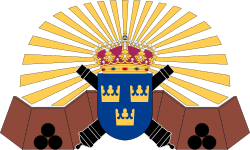Vaxholm Coastal Artillery Regiment
| Vaxholm Coastal Artillery Regiment | |
|---|---|
| Vaxholms kustartilleriregemente (KA 1) | |
 |
|
| Active | 1902–2000 |
| Country | Sweden |
| Allegiance | Swedish Armed Forces |
| Branch | Swedish Navy |
| Type | Coastal artillery |
| Size | Regiment |
| Part of |
Milo Ö (1942–1991) Milo M (1991–2000) |
| Garrison/HQ | Rindö |
| March | "Honnör för Finska Gardet" by R. Arnoldsson (1902–1948) "Gardeskamrater" by S. Rydberg (1948–2000) |
| Commanders | |
| Notable commanders |
Håkan Syrén |
| Insignia | |
| Insignia |  |
| Flag |  |
Coordinates: 59°23′35″N 18°25′53″E / 59.39306°N 18.43139°E
Vaxholm Coastal Artillery Regiment (Swedish: Vaxholms kustartilleriregemente), designation KA 1, was a Swedish Navy coastal artillery regiment of the Swedish Armed Forces which operated between 1902 and 2000. The unit was based at Rindö in the in Uppland.
On 1 January 1902, the Swedish coastal artillery was established as a separate military branch in the Swedish Armed Forces, following a decision taken in May the previous year. The decision meant that Karlskrona Artillery Corps and Vaxholm Artillery Corps was disbanded and that a coastal artillery was established. The Vaxholm Artillery Corps was transferred to the coastal artillery and formed the Vaxholm Coastal Artillery Regiment (KA 1). The regiment manned the Vaxholm Fortress and Oskar-Fredriksborg Fortress as well as Fårösund's coastal position and Hörningsholm's coastal position.
The regimental buildings, drawn by Erik Josephson, were completed in 1906. The barracks were completed already in 1904 and had three floors unlike the design which had four. Parts of KA 1 was placed at Vaxholm and it was not until the 1940s that the operations were collocated to eastern Rindö next to Oskar-Fredriksborg Fortress. KA 1 consisted of artillery companies, naval mine companies and yrkes (occupational) companies: an organization that was maintained until the 1940s. In 1941, the former buildings of the Vaxholm Grenadier Regiment (I 26) became a part of the KA 1. The part of the KA 1 that has been placed at the Vaxholm Fortress was instead placed in the former barracks of I 26.
...
Wikipedia
